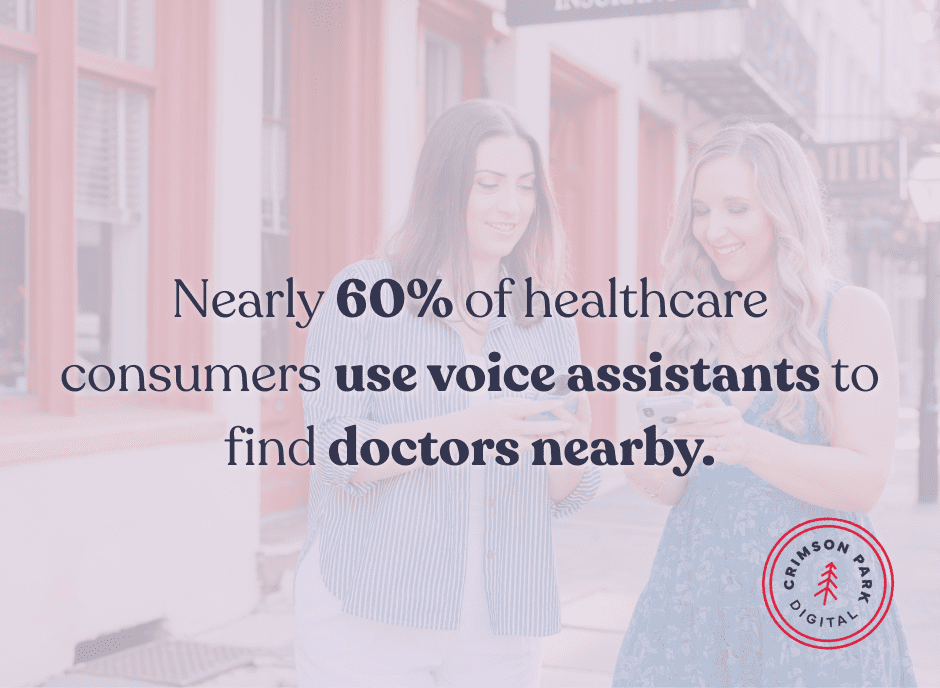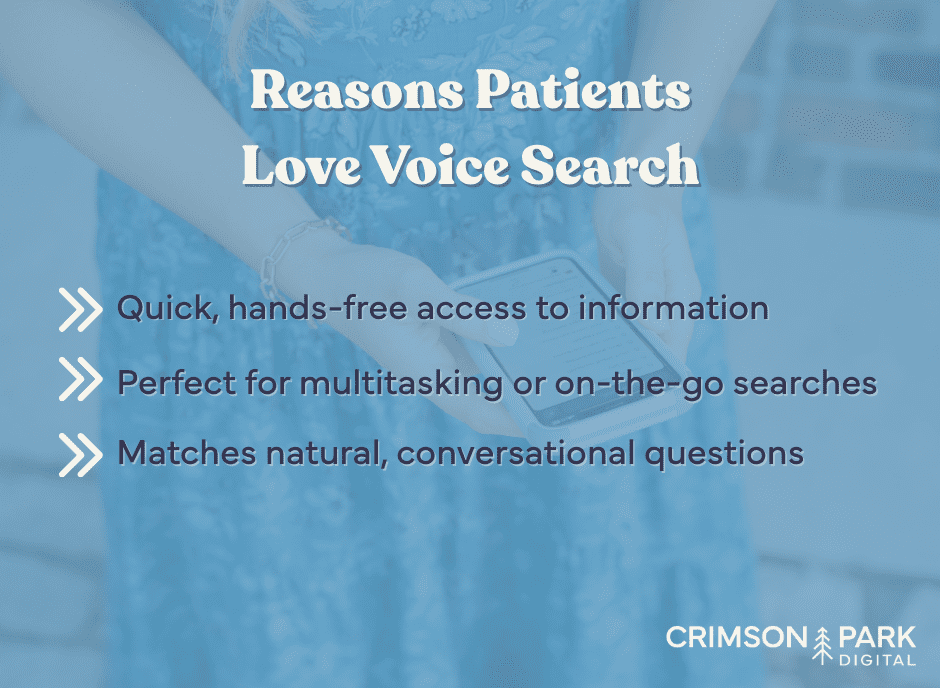Why Voice Search Matters More Than You Think
Voice search isn’t some futuristic concept we’re waiting for; it’s here. Millions of people use voice assistants every day. Patients love it because it’s quick and hands-free. Instead of typing “best pediatrician Charlotte NC,” someone can just ask, “Who’s the best pediatrician near me?”
Healthcare is a perfect fit for voice search. Think about it:
- Parents are wrangling kids while asking for the closest urgent care.
- Someone driving might ask about the nearest pharmacy.
- A patient with limited mobility might rely on voice search instead of typing.
Convenience rules the day, and patients are choosing providers who show up when they need answers fast.

The Big Difference Between Voice and Text Searches
If you’ve been relying on traditional SEO to carry your practice, here’s the kicker: voice searches don’t look like text searches. They’re longer, more conversational, and often phrased as full questions. For example:
Typed: “dermatologist acne Charleston”
Spoken: “Who treats teenage acne near me?”
See the difference? Voice search sounds like how people actually talk. That means your online presence needs to be ready for questions instead of just short, clipped keywords.
Local SEO: The Secret Sauce Patients Don’t See
Here’s where things get interesting. Most voice searches are local. People aren’t asking, “Find me a random dentist anywhere in the U.S.” They’re asking, “Where’s the closest dentist open right now?”
That’s why local SEO is so powerful for healthcare practices. The patient who needs you is already nearby; you just need to make sure you’re visible in the results when they ask.
This comes down to a few behind-the-scenes tactics (the stuff our team at Crimson Park Digital lives for):
- Making sure your practice info is accurate everywhere it appears online.
- Having strong reviews that signal you’re trustworthy.
- Keeping your Google Business Profile polished, active, and up-to-date.
These details may feel small, but they’re the difference between being chosen or skipped over.
What a Voice-Search-Friendly Strategy Looks Like
Think like a patient. Patients don’t search in perfect “SEO speak.” They ask real questions. Your content and website should reflect that.
Answer clearly. Voice assistants love short, direct answers. FAQ sections are gold here — but only if they’re done right.
Stay mobile-first. A slow, clunky site won’t cut it. Patients will bounce, and search engines notice.
Highlight your location. Patients want providers near them. Make sure your online presence makes it crystal clear where you are and who you serve.
See how this is less about chasing keywords and more about matching human conversation? That’s the voice search advantage.

The Patient Experience Bonus
Optimizing for voice search isn’t just about winning rankings. It’s also about making life easier for patients. Imagine being able to say, “Call Dr. Parker’s office” and have your phone do it in seconds, or asking, “What time does the clinic close today?” and getting the answer instantly.
That seamless experience builds trust. Patients feel like your practice is accessible, tech-savvy, and patient-centered, all before they even walk through the door.
Reviews, Reputation, and Voice Search
Here’s a little insider secret: reviews often play into what results voice assistants share. If Siri has to choose between two practices, and one has 100 glowing reviews while the other has only a handful, guess who gets recommended?
That makes your online reputation more important than ever. Encouraging happy patients to leave feedback (and responding thoughtfully when they do) can give you an edge when patients are searching with their voice.
Keeping Up With What’s Next
Voice search is still evolving, and the technology behind it is only getting smarter. Natural language processing (that’s the fancy way of saying “how well machines understand us”) keeps improving, which means patient queries will sound even more human.
Healthcare providers that adapt now will be ready for what’s next, while late adopters will scramble to catch up. The practices that win are the ones paying attention, experimenting, and making sure they’re not stuck in “keyword-only” SEO mode.
Quick Checklist for Staying Visible in Voice Search
Want the CliffsNotes version? Here’s what every healthcare practice should be thinking about:
- Are your business details consistent everywhere online?
- Is your Google Business Profile up to date and active?
- Does your site load quickly on mobile?
- Do you have content that answers common patient questions?
- Are you collecting and managing patient reviews?
If you can confidently check these boxes, you’re in a good place. If not…well, you know who to call.
The Bottom Line
Voice search isn’t just a shiny trend. It’s reshaping how patients make decisions about their care. And in a competitive healthcare market, the practices that get found first often get chosen first.

You don’t need to master every technical detail yourself; that’s where we come in. At Crimson Park Digital, we help healthcare providers stay ahead of digital trends, connect with more patients, and keep their practices thriving.
Want to make sure your practice is ready for the voice search era? Let’s talk!


